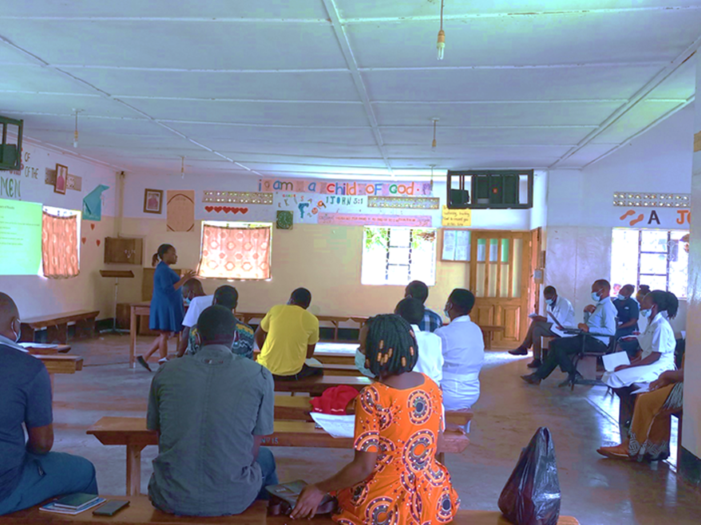Uganda’s Kiwoko Hospital: A Catalyst for Infection Prevention and Antimicrobial Resistance Progress
“Safe and quality health care should be the hallmark for every health facility” —Dr. Peter Serwadda, Kiwoko Hospital Director
Antimicrobial resistance (AMR) is a leading cause of death, spurred in part by overuse and misuse of antimicrobial medicines. A study on antimicrobial use in Uganda found several issues, such as high use of antibiotics across all health facilities, including parenteral antibiotics at 88%, and low compliance to Uganda’s clinical guidelines (30.1%).
Providing safe, responsive, and high-quality health care is at the heart of the mission of Kiwoko Hospital, a private community facility in the Central Region of Uganda. Administered by the Church of Uganda through the Uganda Protestant Medical Bureau, Kiwoko Hospital is the largest health facility in the three districts of Luwero, Nakaseke, and Nakasongola, with a bed capacity of 204 and employing almost 400 personnel. The hospital was formally established in 1991 to respond to the community’s health needs following many years of civil war and the HIV epidemic.
Now, faced with rising AMR and a lack of protocols for infection prevention and control (IPC), Kiwoko Hospital must respond to emerging resistant bacteria and prevent the spread of resistant infections. The US Agency for International Development (USAID) Medicines, Technologies, and Pharmaceutical Services (MTaPS) Program has provided Kiwoko Hospital with technical assistance (training, mentorship, support supervision, and continuous quality improvement plans) and management support (application of the project management cycles and global evidence-based practices and recommendations) in IPC and antimicrobial stewardship (AMS) practices and structures.
Rising to Meet the Challenge of IPC
With support from MTaPS, the hospital developed clear program objectives and outcomes for IPC to improve patient and health worker safety by reducing hospital-acquired infections. Recognizing the need for gradual program implementation guided by available resources and baseline assessment data, the hospital initially implemented a hand hygiene program that identified “hygiene champions” among hospital staff; developed skills on cleaning, sterilization, and disinfection; and fostered a culture of why areas need to be cleaned. In addition, the hospital increased the number of handwashing facilities to include all entry and exit points. Monitoring feedback is provided quarterly to hospital departments, with an award given to the department with the best performance in hand hygiene. Notably, findings of an assessment conducted indicated that Kiwoko Hospital had the highest distribution of hand hygiene facilities in MTaPS-supported health centers in Uganda. Now, as a matter of hospital policy, IPC is incorporated into the standing agenda of departmental meetings, and regular reporting and updates are submitted to the hospital administration to understand progress and challenges related to IPC program implementation. With support from MTaPS, nine continuing medical education activities have been conducted over the past 18 months, reaching 335 health workers (55% female). As a result, health workers’ knowledge on IPC and hand hygiene has improved by 58%.
“The senior hospital management is very supportive when it comes to IPC and because of that, we have all it takes to handle IPC.” Mr. Julius Ojuka, Principal Nursing Officer
Combatting AMR through antimicrobial stewardship (AMS)

Marion Murungi, MTaPS Senior Technical Advisor, facilitating a training session for the DTC to improve antimicrobial stewardship in Kiwoko Hospital, Photo Credit: JP Waswa, MTaPS Uganda
With MTaPS’ technical support, Kiwoko Hospital has undertaken range of activities to combat AMR and strengthen AMS and governance, including institutionalizing quality improvement teams and reconstituting and repurposing the Drug and Therapeutic Committee into the Medicines and Therapeutic Committee (DTC), with representation from all departments. In addition, regular knowledge exchanges and daily staff meetings to review clinical practice and discuss topical issues on drugs, conditions, and their management have supported timely communication and exchange.
Additional trainings on the use of AMS surveillance data have enabled the hospital AMS team to understand the drivers of antibiotic misuse. Ongoing involvement and engagement of the hospital administration has resulted in representation of the facility MTC during the annual facility budgeting process with a budgetary allocation and institutionalization of the MTC in the hospital human resources manual.
“One of the things that is in place because of MTaPS is motivated staff, the functional committees, proper assessment and monitoring practices and support supervision which has been bred into us a sense of accountability.” Dr. James Nyonyintono, Clinical Programs Manager
Conclusion
Building on Kiwoko Hospital’s long-standing commitment to providing safe and high-quality health services, MTaPS has provided technical support to improve its IPC and AMS practices and structures. A key next step is strengthening community awareness to reduce over-the-counter access to prescription medicines and engaging communities in efforts related to AMR control. In addition, the hospital’s IPC and AMR committees can begin implementing annual IPC plans, maintain evidence-based practices, and support monitoring and evaluation. Kiwoko Hospital can cascade best practices and lessons learned from the partnership with MTaPS to other lower-level health facilities.